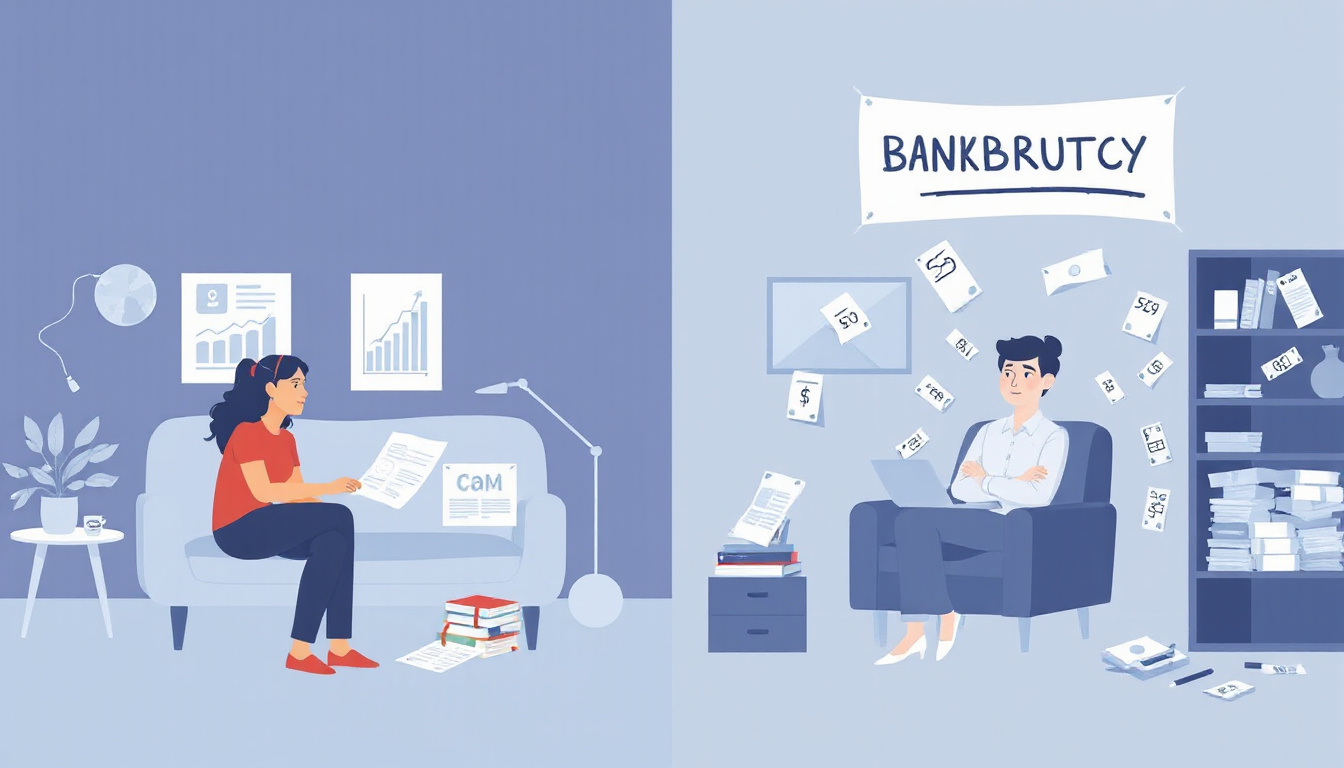In Canada, individuals facing financial difficulties often find themselves at a crossroads when deciding how to manage their debts. One of the most common dilemmas revolves around the question: ‘Is a debt consolidation loan better than bankruptcy?’ Understanding the distinctions between these two options is crucial in making an informed decision. In this article, we will delve into what debt consolidation loans entail, explore the implications of filing for bankruptcy, and provide insight into the key factors you should consider in order to choose the best path for your financial recovery.

Key Takeaways
- Debt consolidation loans combine multiple debts into one manageable payment, often at a lower interest rate.
- Bankruptcy provides a fresh start by discharging most debts, but it can severely impact your credit score.
- Understanding the long-term effects of either option is crucial before making a decision.
- Evaluate your financial situation and goals to determine the most suitable choice for managing debt.
- Both debt consolidation and bankruptcy have their own benefits and drawbacks that should align with your individual circumstances.
Understanding Debt Consolidation Loans
When exploring options for managing overwhelming debt, many Canadians wonder, ‘Is a debt consolidation loan better than bankruptcy?’ Debt consolidation loans can be an effective alternative to bankruptcy, offering a way to combine multiple debts into a single, manageable monthly payment often at a lower interest rate. This not only simplifies your finances but can also help you avoid the severe long-term consequences attached to bankruptcy, such as lasting damage to your credit history. It is important to understand that while debt consolidation loans can be advantageous, they require disciplined repayment habits and awareness of fees or potential pitfalls. On the other hand, bankruptcy, while providing a fresh start, comes with more significant implications for your credit and financial future. Therefore, assessing your unique financial situation is crucial, and consulting with a debt management professional can help you determine the best path forward.
Exploring Bankruptcy: Benefits and Drawbacks
When considering debt management strategies, many Canadians find themselves asking, ‘Is a debt consolidation loan better than bankruptcy?’ This crucial question brings forth a myriad of factors to explore, particularly the benefits and drawbacks of each option. Bankruptcy provides a fresh financial start by discharging most debts, which can be a significant relief for those overwhelmed by financial obligations. However, it comes with substantial long-term impacts on one’s credit score and may affect future financial opportunities. On the other hand, a debt consolidation loan allows individuals to combine multiple debts into a single payment, often with a lower interest rate, potentially making it a beneficial path for managing finances without the drastic consequences of bankruptcy. The choice between these two options largely depends on personal circumstances including the nature of the debt, income stability, and long-term financial goals. It’s essential for Canadians to consider all aspects of both approaches and, if necessary, seek professional financial guidance to navigate their unique situations.
‘The borrower is servant to the lender.’ – Proverbs 22:7

Making the Right Choice: Factors to Consider
When faced with overwhelming debt, one of the pivotal decisions you may encounter is, ‘Is a debt consolidation loan better than bankruptcy?’ To make the right choice, several factors must be considered. First, evaluate your current financial situation, including the total amount of debt, interest rates on existing loans, and your ability to make monthly payments. Debt consolidation loans can simplify your repayment process by combining multiple debts into a single loan with a potentially lower interest rate. However, this option typically requires good credit, and failure to meet repayment terms can lead to further financial strain. On the other hand, bankruptcy might provide immediate relief if your debts are insurmountable, but it comes with long-term consequences such as a significant impact on your credit score and potential asset liquidation. Therefore, assessing your total debt load, your income stability, and the implications of each option is essential. Additionally, consulting with a financial advisor or a credit counselor can provide personalized insights that cater to your unique circumstances. Ultimately, the decision should align with your long-term financial health and stability.
